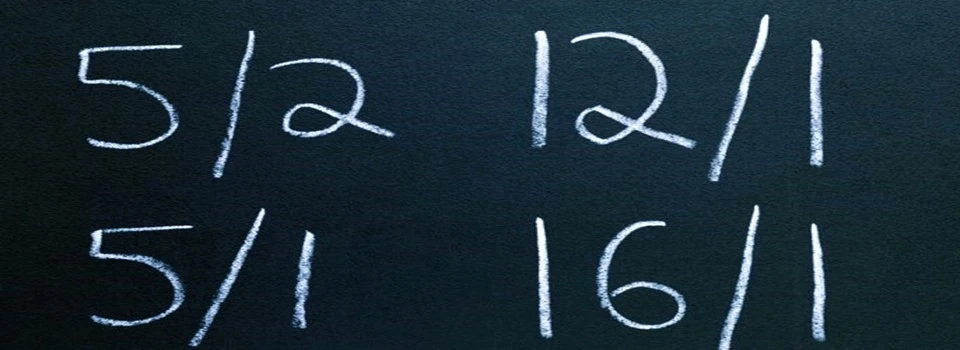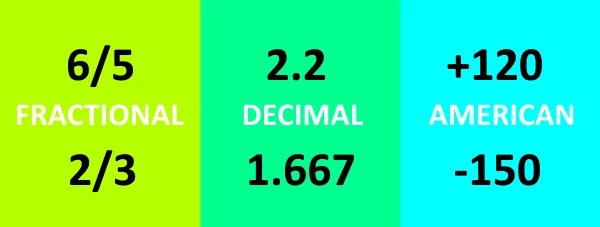What Fractional Odds Mean
Fractional odds are the odds shown in the form of a fraction, which makes sense due to the way they are named.
It essentially means the fraction is multiplied by the stake to calculate the winnings.
However, this isn’t the total return. Players also get the stake back as well as their winnings.

Fractional Odds from a Crypto Perspective
It can be complicated to work out the return from fractional odds when betting with crypto.
For example: 7/5 odds for a wager of 0.00037 BTC could become difficult to work out.
That’s why we’ve put together a few simple tips to help you work out the potential return when you bet with crypto as well as what the numbers mean.
Odds with a Larger Number First
- These are how odds on an underdog are expressed.
- These are normally the most appealing odds to players as they offer the largest payouts.
- The bigger the gap between the first and last number the higher the payout.
Odds with a Smaller Number First
- If the first number is the smallest then this is a bet on the favorite.
- This means that the total payout will be smaller.
- The bigger the gap between the two numbers, the lower the payout.
The Formula to Work out Fractional Payouts
To work out what your profit is, you will need to carry out the following formula: stake * odds
🔹If the odds were 5/1
- you would have to multiply your stake by 5/1.
- By entering this into your calculator it will automatically work out the fraction.
- Once you have done this you can work out your total payout by simply adding your original stake to your profit.
So, if you wagered 0.1 BTC on a 5/1 wager, your profit would be 0.5 BTC.
With the stake added back onto this, it means that your total payout would be 0.6 BTC.
It’s relatively simple to work out round numbers when using cryptocurrency, but it can become more complicated if you’re using less simple numbers. That’s why the formulae further down are so important.
Working out the Implied Probability from Fractional Odds
Working out the implied probability when using fractional odds is extremely simple.
The steps to do so are as follows:
- Add up the total value of both numbers in the fraction
- Then look at the second number in the original fraction
- This is the total chance of winning that you have for your bet out of the total you worked out in the first step
- So, with a 3/1 bet, the implied probability would be that your bet would win 1 out of 4 times
If you’re placing a bet on a favorite then your chances of winning would significantly increase.
For example: a bet on a 1/7 would mean that this bet has a 7 out of 8 chance to win. It should be obvious that in these situations the risk is much lower, which is why the payout is a lot lower.
Finding the Best Value
Finding the best value for bets using fractional odds is linked to many other techniques, so firstly you need to make sure that you have carried out a lot of research.
If your research is of a high enough standard you will be able to find out which bets provide the best value.
- The main way that you would do this is by using the implied probability that the odds provide.
If you find a bet that offers implied odds of 1 in 4 bets winning, but the stats point towards 2 in 4 bets winning, then this would be good value.
- It’s also possible to find good value by using in-play betting. Here you will be able to see how the game is going and use the changing odds to find value.
For example: a favorite going a goal down early in a soccer game would increase the odds of winning the game.
Fractional Odds Converted to Other Odds
If you’re used to using odds in different formats, then being able to convert fractional odds should make you more comfortable. Look through our simple formulas so that you’re able to understand what fractional odds are offering fully.

1. Converting to Decimal Odds
Converting from fractional to decimal odds is the easiest conversion to do.
The formula is as follows: 1 + (fractional odds calculated)
| An example of this could be 2/1. | An example of this could be 1/2. |
| 🔹In this case, you calculate 2/1 which answers 2. So, the decimal odds would be 1 + 2 which equals 3.00. | 🔹In this case, you calculate 1/2 which answers 0.5 So, after adding 1 to that total, the decimal odds would be worked out at 1.5. |
2. Converting to American Odds
This is a little bit more complicated. Because American odds have both positive and negative options available. It means that there are two different formulae here.
One for when the first number is higher and one for when the second number is higher.
| When the First Number is Higher | When the Second Number is Higher |
| The formula for this is simple, and it’s carried out as follows: 🔹(Odds calculated out) * 100 | The formula here is slightly more complicated, and it’s carried out as follows: 🔹-100/(odds calculated out) |
| So, the odds of 2/1 would be calculated out to 2. Then, they would be multiplied by 100 | In this case, odds of 1/2 would answer 0.5 when calculated out. The sum you carry out would then be -100/0.5. This answers -200. |
Reasons to Convert Odds
The main reason to convert odds is so that you can find the best value bets on offer at different crypto betting sites. It might be difficult to compare odds if they are all in various formats.
That’s why it’s best to convert them all into the same format and from there see which crypto sportsbook is offering the best odds.
This will make sure that you get the best payouts possible when placing your bets.
In 2016, he worked on his first client to help write a white paper for a crypto and blockchain project they were building, and started delving deeper into blockchain and distributed ledger technology.
Lives In
New York
University
University of Michigan


Facts Checked by Will Wood



 Fact checked by
Fact checked by 
 shahnakul23@gmail.com
shahnakul23@gmail.com 
